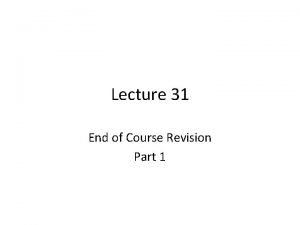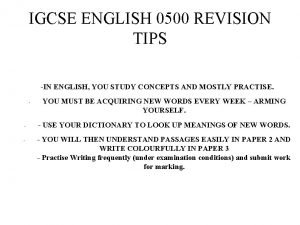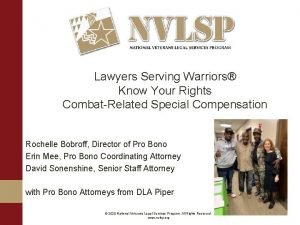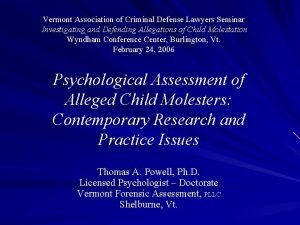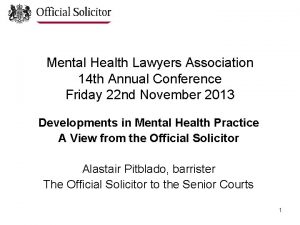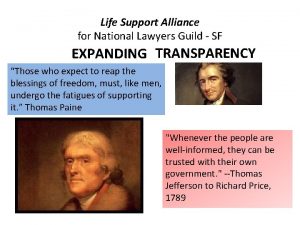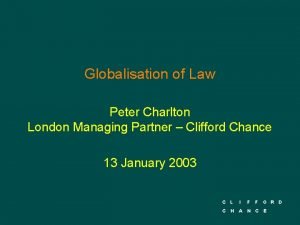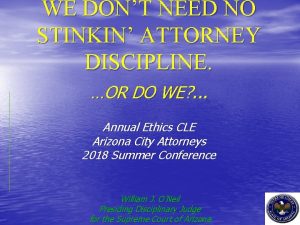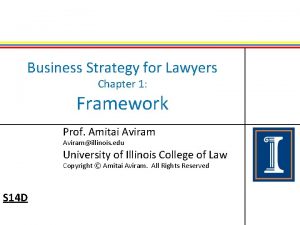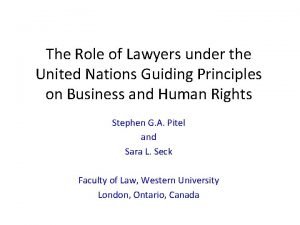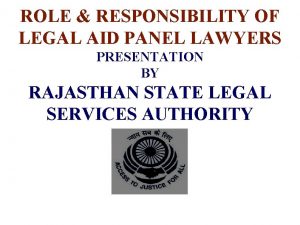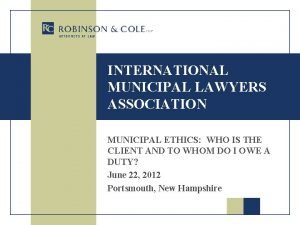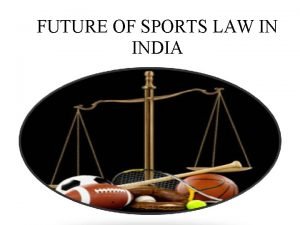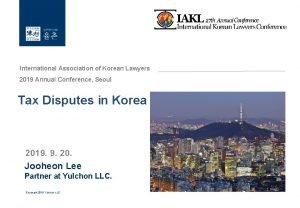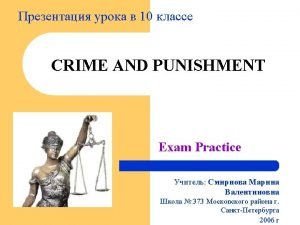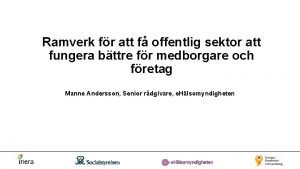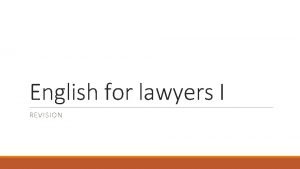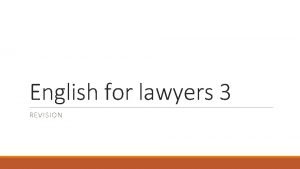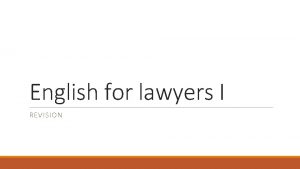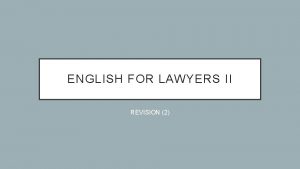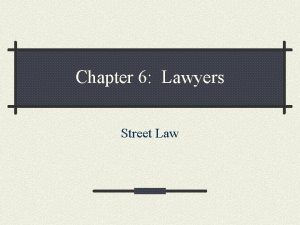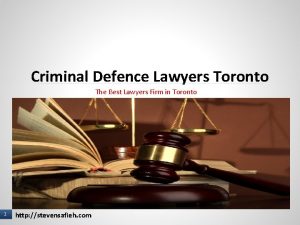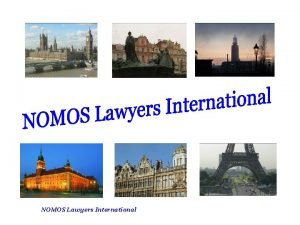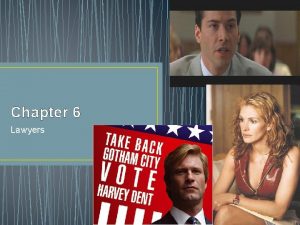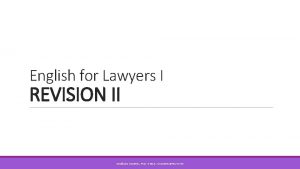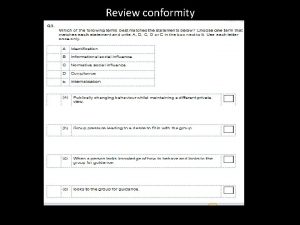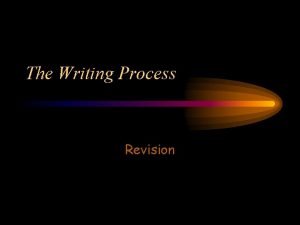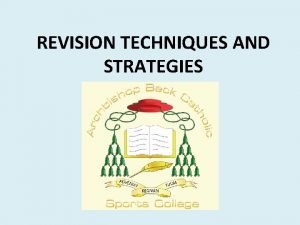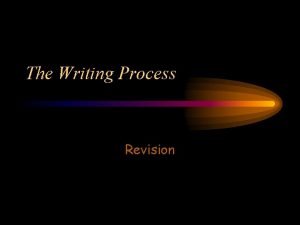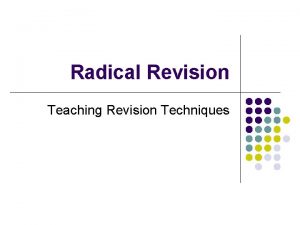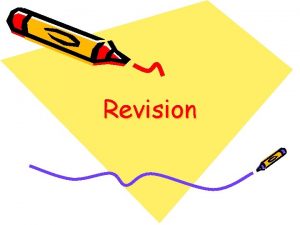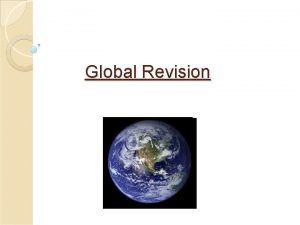ENGLISH FOR LAWYERS I Revision Part I Answer











































- Slides: 43

ENGLISH FOR LAWYERS I Revision Part I

Answer the following questions: ■ What are languages for specific purposes (LSP)? ■ When did they develop and why? ■ How does legal English differ from other languages for specific purposes? ■ What is the goal of plain legal language movements? ■ What are the special characteristics of legal English? ■ Which languages exerted a major influence of legal English? Provide examples. ■

Answer the following questions: ■ Provide an example of ordinary words which have a special meaning in legal English. ■ Provide an example of legal doublets. ■ What are the syntactic features of legal English? ■ Why are passive structures so frequent in legal English? ■ What is the meaning of legal „shall”?

Answer the following questions ■ 1. Who were the earliest inhabitants of the British Isles? ■ 2. Who invaded the British Isles in different historical periods? ■ 3. What languages were spoken by the invaders? ■ 4. Which legal languages had a dominant role in England in the medieval period? ■

Answer the following questions: ■ Why was French important in the history of English? ■ When was the Statute of Pleading enacted and why was it important? ■ Which areas of law remained relatively free of French-based terminology? Why?

Fill in the missing words: conquest, customary, French, Latin, legal, Pleading, proceedings, records ■ In prehistoric Britain, traditional _____law was discussed in the vernacular. The _______language and legal tradition changed with waves of conquerors over the following centuries. Roman Britain (after the ______beginning in AD 43) followed Roman legal tradition, and its legal language was ______. Following the Roman departure from Britain c. 410 and the Anglo-Saxon invasion of Britain, the dominant tradition was instead Anglo-Saxon law, which was discussed in the Germanic vernacular (Old English), and written in Old English since circa 600. Following the Norman invasion of England in 1066, Anglo-Norman French became the official language of legal ________ in England for a period of nearly 300 years until the ________ in English Act 1362 (and continued in minor use for another 300 years), while Medieval Latin was used for written _______ for over 650 years. Some English technical terms were retained, however.

Fill in the missing words: Act, legal, pleading, proceedings, recorded, records, Statute ■ In legal pleadings, Anglo-Norman developed into Law French, from which many words in modern legal English are derived. These include property, estate, chattel, lease, executor, and tenant. The use of Law French during this period had an enduring influence on modern legal English. That use also accounts for some of the complex linguistic structures used in legal writing. In 1362, the Statute of Pleading was enacted, which stated that all legal __________ should be conducted in English (but________ in Latin). This marked the beginning of formal Legal English; Law French continued to be used in some forms into the 17 th century, although it became increasingly degenerate. ■ From 1066, Latin was the language of formal ________ and statutes, and was replaced by English in the Proceedings in Courts of Justice ______ 1730. However, because only learned persons were fluent in Latin, it never became the language of legal _________ or debate. The influence of Latin can be seen in a number of words and phrases such as ad hoc, de facto, bona fide, inter alia, and ultra vires, which remain in current use in _______ writing.

Provide the legal terms corresponding to the following definitions: ■ Monetary compensation in civil lawsuits: ■ Damages ■ A sequence of words which usually occur together ■ collocation ■ The act of interpreting and giving meaning to a statute or the language of a document such as a contract or will when there is some ambiuity or question about its meaning ■ construction

Provide the legal terms corresponding to the following definitions: ■ Two or more synonymous words occurring together ■ Doublet ■ A type of verb that us used to express permission, obligation, likelihood, ability, etc. ■ Modal verb ■ A type of function word which stands for another word, phrase, clause or sentence where the meaning is recoverable from the context ■ Pro-form

Provide the legal terms corresponding to the following definitions ■ The analysis and description of the structure of a given language’s sentences ■ Syntax ■ The feature of legal English where nouns are used instead of verbs in conveying information related to actions and processes ■ Nominalisation ■ A written law enacted by a legislative body and signed by the head of state ■ Statute, Act of Parliament

Combine the appropriate words to form collocations verb noun impose debt convey influence enact problem exert information owe statute pay obligation resolve attention

Translate into Croatian ■ Languages for Specific Purposes emerged during the post-Second World War development of science and technology, as an answer to students and specialists’ need to learn languages related to their fields of study or work. Thus LSP is a widely applied approach to language teaching that addresses the immediate and very specific needs of learners who use that language as a tool in their education, training or job.

Answer the following: ■ 1. How can we define law? ■ 2. What are the two ideas that underlied the concept of law? ■ 3. What are the main functions of law? ■ 4. What is the purpose of law? ■ 5. What are the main differences between natural theory of law and legal positivism? ■

Answer the following: ■ 6. How can justice be attained by a legal system? ■ 7. How can we define a state? ■ 8. What does the United Kingdom consist of? ■ 9. Is there a single legal system in the United Kingdom? ■ 10. Where does English law apply? ■ 11. How does the legal system of Scotland differ from English law?

Answer the following ■ What was the aim of Hart v Fuller debate? ■ Which essential principles does „inner morality of law” consist of according to Fuller?

Fill in the missing words: authority, convention, morality, natural, theory, validity ■ According to _______law theory of law, there is no clear division between the notion of law and the notion of _______. Though there are different versions of natural law ________, all subscribe to thesis that there at least some laws that depend for their „____" not on some pre-existing human convention, but on the logical relationship in which they stand to moral standards. Otherwise put, some norms are authoritative in virtue of their ______content, even when there is no ___________ that makes moral merit a criterion of legal________.

Fill in the missing words: conduct, definition, law, purposive, rules, system, theories ■ The only formula that might be called a _______ of law offered in these writings is by now thoroughly familiar: _____ is the enterprise of subjecting human _______ to the governance of _________. Unlike most modern _______of law, this view treats law as an activity and regards a legal _________as the product of a sustained ______ effort (Fuller 1964, 106).

Fill in the missing words: conduct, essential, function, implies, law, rules, social. ■ To the extent that a definition of ______ can be given, then, it must include the idea that law's _____function is to "achieve ____ order through subjecting people's _______to the guidance of general ______ by which they may themselves orient their behavior" (Fuller 1965, 657). ■ Fuller's functionalist conception of law _______ that nothing can count as law unless it is capable of performing law's essential ______ of guiding behavior.

Provide legal terms matching the definitions: ■ A punishment for an act which goes against what is generally accepted behaviour ■ Sanction ■ General agreement ■ Consensus ■ The place in which a case is being heard ■ Court, tribunal, forum ■ Property which is received by someone from a person who has died ■ inheritance

Provide legal terms matching the definitions: ■ A disagreement or argument between parties ■ Dispute ■ Things that are owned by someone ■ Property ■ An assertion of a legal right ■ Claim ■ A failure to obey the law ■ breach

Provide legal terms matching the definitions: ■ The power to force someone to comply with the law ■ Enforcement ■ Legally binding agreement between two or more parties ■ Contract ■ The system of fundamental rules and principles that prescribes the nature, functions, and limits of a government and the rights of citizens ■ Constitution

Provide legal terms matching the definitions: ■ A territorial division in which a community of people lives subject to a uniform system of law administered by a sovereign authority ■ State ■ To examine and determine judicially facts and legal issues arising between parties in a dispute ■ Try ■ To pronounce judgement by a court in criminal proceedings specifying the punishment to be imposed upon the person convicted of a crime ■ sentence

Provide legal terms matching the definitions: ■ To find or prove someone guilty of an offence ■ Convict ■ The process of passing a law ■ Enactment ■ To institute criminal proceedings against an offender ■ Prosecute ■ Conformity, agreement ■ compliance

Provide legal terms matching the definitions: ■ The use of force to make someone do something ■ Coercion ■ Basic reasons ■ Grounds ■ The study of law and legal theory ■ Jurisprudence ■ Putting a law into effect by public announcement ■ Promulgation ■ An Act of Parliament ■ statute

Match the verb with the appropriate noun: verb noun attain Rules (2 x) protect disputes Lay down contract Enter into policy resolve justice adopt rights apply justice

Translate into Croatian ■ It is often said that the law provides justice, yet this is not always so. Justice is probably the ultimate goal towards which the law should strive, but it is unlikely that law will ever produce 'justice' in every case. In some situations people's concept of justice may not be the same. Justice can be seen as applying the rules in the same way to all people, but even this may lead to perceived injustices, indeed the rigid application of rules may actually produce injustice.

Translate into Croatian ■ Societies govern themselves by rules of different types, written or unwritten. Without these codes of acceptable behaviour, there would be no society, no order, only chaos and anarchy. We conduct our lives according to learned or agreed rules of conduct. ■

Answer the following: ■ What is the difference between private law and public law? ■ What is the difference between substantive and procedural law? ■ What is the difference between national and international law? ■ What are the main branches of public law? ■ What is the basic difference between public and private law? ■ Why does criminal law belong to public law? ■ What are the main differences between criminal law and civil law? ■ What are the main branches of private law? ■ What are three branches of government?

Answer the following: ■ What is a tort? ■ What are the main types of tort? ■ What does law of property determine? ■ What does family law cover? ■ What is law of succession concerned with? ■ What does company law regulate? ■ What does employment law cover?

Answer the following: ■ Who decides issues of fact for indictable offences in common law countries? ■ What is the role of the jury in criminal trials? ■ What is the role of the judge in criminal trials? ■ What happens if the judge finds a civil case proven? ■ What is the most common legal remedy in civil cases?

Fill in the missing words: constitutional, criminal, government, law, private, rules, society, tax, ■ Public law is that part of law which governs relationships between individuals and the _______, and those relationships between individuals which are of direct concern to ______. Public law comprises ______ law, administrative law, ______law and ______law. as well as all procedural ____. In public law, mandatory ________ prevail. Laws concerning relationships between individuals belong to _______law.

Fill in the missing words: administrative, governs, judicial, local, obey, rights, rule, unequal ■ The relationships public law _____ are asymmetric and_____ government bodies (central or _____) can make decisions about the ______of individuals. However, as a consequence of the _____of law doctrine, authorities may only act within the law (secundum et intra legem). The government must_____ the law. For example, a citizen unhappy with a decision of an ______ authority can ask a court for ______ review.

Provide legal terms matching the definitions: ■ Law which determines which national law governs a case in which there is a foreign element ■ Private international law/Conflict of laws ■ Law which governs relationships between states and other entities operating on the international plane ■ Public international law

Provide legal terms matching the definitions: ■ The rules which regulate the structure of the main branches of government and the rights of citizens ■ Constitutional law ■ The law that governs the exercise of powers and duties by public authorities ■ Administrative law ■ The law tjhat sets up the types of behaviour which are forbidden and are subject to punishment ■ Criminal law

Provide legal terms matching the definitions: ■ The branch of law which determines whether a promise is legally enforceable and what are its legal consequences ■ Law of contract ■ The branch of law which deals with civil wrongs ■ Law of torts ■ The branch of law that deterines the nature and extent of the rights which people may enjoy over land other property ■ Law of property

Provide legal terms matching the definitions: ■ A branch of law that covers such matters as whether a marriage is valid, what the rules are for divorce and who should have the custody of the children ■ Family law ■ A branch of law which is concerned with regulating who inherits property when a person dies without a will, and also with the rules for making a valid will ■ Law of succession ■ A branch of law which regulates how a company should be formed, sets out formal rules for running companies, and deals with rights and duties of shareholders and directors. ■ Company law

Provide legal terms matching the definitions: ■ A branch of law which covers all aspects of employment, from the original formation of a contract of employment to situations of redundancy or unfair dismissal ■ Employment law ■ Injury to someone’s reputation by publication of an untrue statement about them ■ defamation ■ Something which causes harm or inconvenience to a person or property ■ Nuisance

Provide legal terms matching the definitions: ■ A formal written agreement between two or more countries ■ Treaty ■ The fact of being legally responsible for paying for damage or loss incurred ■ Liability ■ A person who makes a claim against someone in civil courts ■ Claimant ■ To set a person free because he or she has been found not guilty ■ Acquit

Provide legal terms matching the definitions: ■ A situation where someone is no longer employed because the job is no longer needed ■ Redundancy ■ The legal right of a parent to keep and bring up a child after a divorce ■ Custody ■ Someone who is sued in a civil case or accused in a criminal case ■ Defendant ■ Failure to give proper care to something ■ Negligence

Provide legal terms matching the definitions: ■ Interfering with the land or goods of another person ■ trespass

Match the verbs with the appropriate nouns/adjectives verb Noun/adjective find Crime (2 x) take judgement enforce sentence The law prosecute will lay down guilty commit right break action make verdict enter rules

Translate into Croatian ■ Civil law regulates relations between private persons or bodies. It is usually invoked only by the parties seeking to protect their private rights or interests. By contrast, a criminal offence is a wrong against the community. While the state has no interest in pursuing your civil claim, if you are a victim of a crime, such as theft, the state may prosecute the offender, whether or not you wish to take action against him/her. The aim of taking a criminal case to court is to punish the wrongdoer.

Translate into Croatian ■ Media Law is a fast developing and increasingly high profile area of law. It is an area related to freedom of expression and the right to communicate. The course covers a number of key themes in Media Law and will begin by looking at the meanings of media freedom
 Passive progressive
Passive progressive End of lecture
End of lecture English revision outwood
English revision outwood Igcse
Igcse Revision.english.outwood
Revision.english.outwood A level english language frameworks
A level english language frameworks Ogat english revision
Ogat english revision Explain the need of accountancy for lawyers
Explain the need of accountancy for lawyers Rochelle bobroff
Rochelle bobroff Vermont association of criminal defense lawyers
Vermont association of criminal defense lawyers Mental health lawyers association
Mental health lawyers association National lawyers guild sf
National lawyers guild sf Immigration lawyers charlton
Immigration lawyers charlton Premium digital marketing for lawyers
Premium digital marketing for lawyers Lawyers oath
Lawyers oath Southeast asia customs lawyers
Southeast asia customs lawyers Pro bono lawyers in alabama
Pro bono lawyers in alabama Business strategy for lawyers
Business strategy for lawyers United nations basic principles on the role of lawyers
United nations basic principles on the role of lawyers Horizon nj health prior authorization form
Horizon nj health prior authorization form Legal aid panel lawyers
Legal aid panel lawyers International municipal lawyers association
International municipal lawyers association Sports lawyers in india
Sports lawyers in india International association of korean lawyers
International association of korean lawyers Progress lawyers
Progress lawyers Revision: passive voice
Revision: passive voice Iso 22301 utbildning
Iso 22301 utbildning Typiska novell drag
Typiska novell drag Nationell inriktning för artificiell intelligens
Nationell inriktning för artificiell intelligens Ekologiskt fotavtryck
Ekologiskt fotavtryck Varför kallas perioden 1918-1939 för mellankrigstiden?
Varför kallas perioden 1918-1939 för mellankrigstiden? En lathund för arbete med kontinuitetshantering
En lathund för arbete med kontinuitetshantering Adressändring ideell förening
Adressändring ideell förening Personlig tidbok fylla i
Personlig tidbok fylla i Sura för anatom
Sura för anatom Förklara densitet för barn
Förklara densitet för barn Datorkunskap för nybörjare
Datorkunskap för nybörjare Boverket ka
Boverket ka Mall debattartikel
Mall debattartikel Delegerande ledarstil
Delegerande ledarstil Nyckelkompetenser för livslångt lärande
Nyckelkompetenser för livslångt lärande Påbyggnader för flakfordon
Påbyggnader för flakfordon Lufttryck formel
Lufttryck formel Publik sektor
Publik sektor

